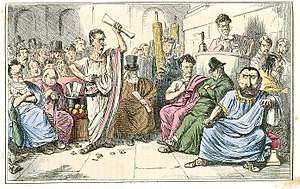First Catilinarian conspiracy
In the history of the Roman Republic, the first Catilinarian conspiracy was a plot to murder the consuls of 65 BC, Lucius Manlius Torquatus and Lucius Aurelius Cotta. Supposedly, Catiline intended to seize power following an electoral dispute, in which the original set of candidates elected to the office were deemed ineligible. Historians consider it unlikely that Catiline would have been involved in the first Catilinarian conspiracy or, indeed, that the conspiracy existed at all. Two years later, Catiline would lead the Second Catilinarian conspiracy, better known as the Catiline Conspiracy, to overthrow Cicero and his co-consul Gaius Antonius Hybrida.
History

In all likelihood, Catiline was not involved in the so-called first Catilinarian conspiracy, although several historical sources implicate him in it. There does not seem to be a single account that is represented in all of the sources: rather, it seems that the accounts represent a collection of rumors accusing different political figures in attempts to tarnish their names. As it pertains to Catiline, much of the information originates in Cicero's speech In Toga Candida which was given during his election campaign in 64 BC. Only fragments of this speech still exist, in the later writing of Asconius Pedianus.
The consuls-designate of 65 BC, Publius Autronius Paetus and Publius Cornelius Sulla, were accused and convicted of ambitus, electoral corruption, preventing them from entering office under the Lex Acilia Calpurnia.[1] Thus, the two other leading candidates, Lucius Manlius Torquatus and Lucius Aurelius Cotta, were elected in a second election and were to enter office on January 1, 65 BC. Supposedly, Catiline, incensed because he was not allowed to stand for the consulship, conspired with Gnaeus Calpurnius Piso and the former consuls-designate to slaughter many of the senators and the new consuls the day they assumed office. Then they would name themselves the consuls for the year and then Piso would have been sent to organize the provinces in Hispania.[2] Alternatively, Suetonius claims that Julius Caesar and Marcus Licinius Crassus directed the conspiracy, but he fails to mention Catiline's involvement. Instead of assuming the consulship, Crassus is accused of planning to become dictator and intending to name Caesar magister equitum.[3]
In 62 BC, after Catiline's death, Cicero defended Publius Sulla in court after he was indicted for being a member of the second conspiracy. In order to free his client of implication in the first Catilinarian conspiracy, he places the blame solely on Catiline who, conveniently, had waged war against the Republic in the previous months.[4] In the end, Publius Sulla was acquitted, Catiline's name was further tarnished, and Cicero received a large loan to purchase a home.[5] It is not clear who participated in this alleged conspiracy, as the different accounts accuse different people, but Catiline's association with it appears to have been developed after the Second Catilinarian Conspiracy. Cicero's accusations prior to 63 BC are likely unfounded, since Rome had no penalty for libel. Furthermore, Catiline had little motive to participate in this conspiracy, especially since he had been denied very little. He still held the aspiration of obtaining the consulship legitimately the next year, and the conspiracy involved the murder of the consul, Manlius Torquatus, who supported Catiline.
See also
- Roman civil wars
Footnotes
Further reading
- Seager, Robin. "The First Catilinarian Conspiracy", JSTOR, July, 1964. Retrieved March 17, 2013.
- Holmes, Patrick. "The 'First' Catilinarian Conspiracy: A Further Re-examination of the Evidence", Reinvention: a Journal of Undergraduate Research, 2011. Retrieved March 17, 2013.